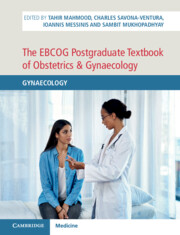Book contents
- The EBCOG Postgraduate Textbook of Obstetrics & Gynaecology
- The EBCOG Postgraduate Textbook of Obstetrics & Gynaecology
- Copyright page
- Dedication
- Contents
- Videos
- Contributors
- Preface
- Section 1 Basic Sciences in Gynaecology
- Chapter 1 Preoperative and Postoperative Care of the Gynaecological Patient
- Chapter 2 Acute Gynaecological Emergencies
- Chapter 3 Imaging in Gynaecological Practice
- Chapter 4 Basic Surgical Skills in Gynaecological Practice
- Chapter 5 Developmental Female Genital Tract Anomalies
- Chapter 5a Vaginal Aplasia: Creatsas Vaginoplasty
- Section 2 Menstrual Disorders
- Section 3 Reproductive Endocrinology and Infertility
- Section 4 Contraception and STIs
- Section 5 Post-Reproductive Care
- Section 6 Vulva and Vagina
- Section 7 Cervix
- Section 8 Uterus
- Section 9 Ovary and Fallopian Tubes
- Section 10 Operative Gynaecology
- Section 11 Public Health Issues in Gynaecology
- Section 12 Miscellaneous
- Index
- Plate Section (PDF Only)
- References
Chapter 5a - Vaginal Aplasia: Creatsas Vaginoplasty
from Section 1 - Basic Sciences in Gynaecology
Published online by Cambridge University Press: 24 November 2021
- The EBCOG Postgraduate Textbook of Obstetrics & Gynaecology
- The EBCOG Postgraduate Textbook of Obstetrics & Gynaecology
- Copyright page
- Dedication
- Contents
- Videos
- Contributors
- Preface
- Section 1 Basic Sciences in Gynaecology
- Chapter 1 Preoperative and Postoperative Care of the Gynaecological Patient
- Chapter 2 Acute Gynaecological Emergencies
- Chapter 3 Imaging in Gynaecological Practice
- Chapter 4 Basic Surgical Skills in Gynaecological Practice
- Chapter 5 Developmental Female Genital Tract Anomalies
- Chapter 5a Vaginal Aplasia: Creatsas Vaginoplasty
- Section 2 Menstrual Disorders
- Section 3 Reproductive Endocrinology and Infertility
- Section 4 Contraception and STIs
- Section 5 Post-Reproductive Care
- Section 6 Vulva and Vagina
- Section 7 Cervix
- Section 8 Uterus
- Section 9 Ovary and Fallopian Tubes
- Section 10 Operative Gynaecology
- Section 11 Public Health Issues in Gynaecology
- Section 12 Miscellaneous
- Index
- Plate Section (PDF Only)
- References
Summary
Mayer–Rokitansky–Küster–Hauser (MRKH) syndrome is a rare congenital abnormality of the female genital tract presenting with aplasia of the uterus and the upper two-thirds of the vagina in an otherwise normal 46XX individual. The incidence is approximately one case in 4000 women. The syndrome is frequently associated with other non-gynaecological defects, such as urinary tract anomalies, vertebral deformities and, to a lesser extent, auditory and cardiac lesions. The absence of the vagina and the uterus have a profound psychological impact on the young woman’s sense of femininity, so the demand for a sexual life makes the creation of a neovagina strongly advisable. Diagnosis is based on the history, the clinical and gynaecological examination, ultrasonography, including the urinary tract examination to exclude relative anomalies, and laparoscopy and hysteroscopy to diagnose and classify the relative uterovaginal anomaly.
- Type
- Chapter
- Information
- The EBCOG Postgraduate Textbook of Obstetrics & GynaecologyGynaecology, pp. 44 - 46Publisher: Cambridge University PressPrint publication year: 2021



